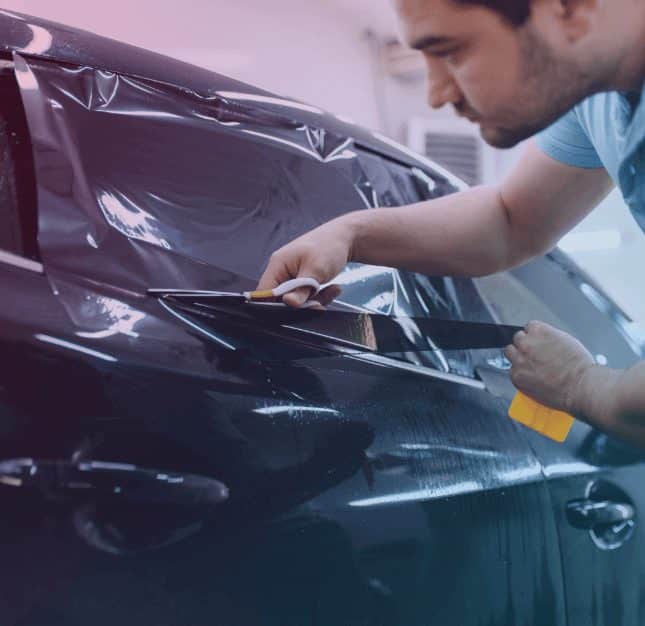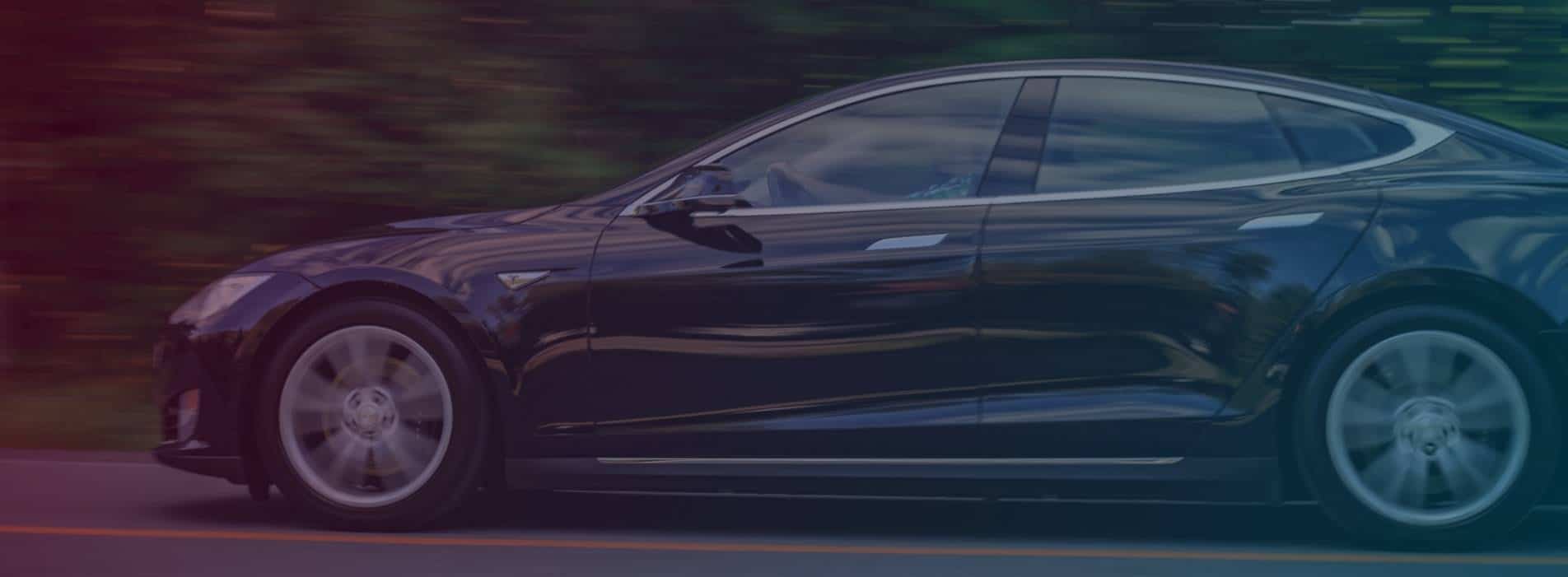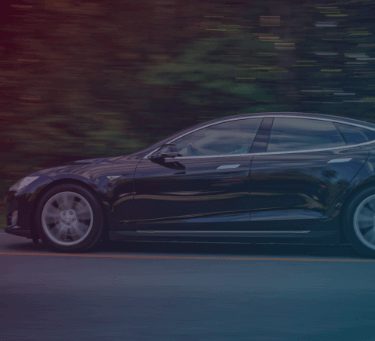
Here at Tintix, we provide excellent ceramic window tinting services at competitive prices to keep the cost low for you!
With all the car window tint film options out there, it may seem difficult to decide which one is right for your car. Recently, ceramic window tinting has emerged as the industry leader in terms of quality, protection, and appearance.
Many people are aware of car window tinting and the different types of films that can be placed on the windows of cars, buildings, homes, and boats. The most common materials used to tint or film windows that people are familiar with include polyester, dyes, and metal. However, an increasingly popular option that is being used more and more is ceramic window film. You might ask, “How is this possible?” since ceramic is used to make completely opaque objects, like ceramic artwork, electrical conductors, and optics, but this new technology has proven to be the highest quality of window film.
The ceramic film also does not contain any dyes, metals, or carbon. Instead, it’s made up of tiny, ceramic-based nanoparticles that are invisible to the naked eye. This means you’ll have an easier time seeing on the road with ceramic window tint than with other films.
Until the past 10 years or so, most car window tinting products were dyed or metallised to provide all of the benefits car window tinting offers. Now, newer products have entered the market—and at notably higher price points. It’s important to learn about the pros and cons of each as you determine which window tint product makes the most sense for the application and your budget.
Many ask, “What is a ceramic tint?”
Ceramic window tinting film is a type of window tint that can be applied to any kind of window. Unlike other films, it is not made of metal, nor is the film dyed to be a darker shade. This means that this film is both non-metallic and does not conduct. Instead, the film is imbued with small, ceramic-based nanoparticles. Since these particles are so small, they are actually not visible to the naked eye. As a result, you have a completely clear window film, allowing a greater level of visibility both during the day and at night. Additionally, it is tougher and more durable.
Anytime you opt for a higher-grade product, it should come with some elevated attributes. Such is the case with ceramic window tinting vs. buying a regular tint.
In Brentwood, California, car owners are often on the lookout for ways to make their vehicles more comfortable on hot, sunny days. That’s why so many people invest in ceramic window tint.
There are many reasons why you should choose ceramic window tint for your car, but we’ve narrowed the list down to six major advantages:
Ceramic window tints can protect you from 99% of the UV rays that normally enter through car windows.
Ceramic window tints also come in a large variety of shades, including 70%, which is almost completely clear and makes driving safer, especially at night since it reduces glare but does not impede visibility through the tinted glass.
Darker shades reduce glare on the driver even more effectively.
Ceramic tint is made to block light without compromising the look through the windows. UV and infrared rays are harmful, dangerous, and can cause life-altering changes. The sun emits many different levels of radiation. Infrared radiation (or IR), which generates heat, ultraviolet A (UVA), which penetrates deeply into tissues and materials, and ultraviolet B (UVB), which damages surfaces are the three main emissions.
Not only is sun glare annoying when you’re on the road, but it can also make driving more dangerous. The strong, dazzling sun can cause extreme contrasts in light intensity, leading to eye strain or a higher risk of an accident from being unable to see properly.
Ceramic window tint can help you stay safe on the road by reducing sun glare. For example, a 50% tint willonly let half the light into your car, which makes it a lot easier to see while you’re driving and safer as there will be no sunlight glaring at you. That’s even true at night, as ceramic tint film is designed to block light without compromising your safety or visibility.
Did you know that NASA’s space shuttle featured ceramic tiles along the bottom of the orbiter, which helped protect astronauts during re-entry? While the IR emissions from the sun on earth are not as hot as in space, similar materials in this upgraded window tint helps to block heat from entering the vehicle. There are some superior grade ceramic tints that are infused with added IR blocking technology for even better heat resistance.
A high-quality ceramic window tint not only blocks UV rays, but it also blocks 80%–98% of infrared light. Infrared rays are why we feel the heat from the sun, so with fewer rays coming in, tinted windows decrease your vehicle’s interior temperature, even if you have to park in the sun.
With less infrared light coming into your car, you can also save energy and money. You won’t have to run your a/c as often when your car is already cool, putting less strain on your engine, your gas tank, and your wallet!
Looking for professional Ceramic Window Tint near you? Tintix professionals are here to take care of your car. Call us today!
With ceramic window tint, you won’t have to deal with electronic signal interference. That means you can turn up the radio and safely make a phone call without worrying about static or dropped calls while you’re driving.
After tinting your windows, the first thing you’ll notice is how much darker they are (although that won’t compromise your visibility on the road). Nobody will be able to see what’s inside the vehicle, which will likely deter someone who would’ve broken into or jacked your car.
The durable material and advanced technology of ceramic window tint shield you and your passengers, and will also mask any valuables you may be transporting. At the same time, the darker color will not affect your visibility as you operate your car.
Along with added privacy, ceramic window tint will also help you and your passengers avoid injuries from shards of glass. While it won’t prevent your windows from breaking in the event of an accident, ceramic window tint will keep the glass from shattering.
Ceramic window tints are one of the most durable types of car window tints that you can ever have. The dye will not change color over time and will maintain its good looks. It would also take more effort to break windows with ceramic tints.
Ceramic window tint may cost a bit more than other films, but a quality installation from professionals like TINTIX will make that investment worth it in the long run. By tinting your windshield and windows, you’re giving your car a scratch-resistant flair that will last for a lifetime.
Due to the fact that ceramic window tint is made up of tiny nanoparticles that are bound tightly together, it’s highly durable. That means it can stand up against potential criminals, small rocks on the road, and even stray golf balls!
For over a decade, most car window tinting products were dyed or metallized to provide the benefits that window tinting offers for your vehicle. Now new products are entering the market, but at relatively higher prices. Knowing the advantages and disadvantages of each type can help you decide which one is best for you.
What is the difference between Ceramic tint window film and Standard or Regular window tint?
Ceramic window tint is the most premium film on the market and is well known (particularly in Brentwood, California) for its high heat rejection properties. While it uses the same type of sheets as regular window film, the material is coated with ceramic particles.
Ceramic window tint contains no metal, dye, or carbon, but rather a nonconductive and nonmetallic ceramic particle.
While invisible to the naked eye, this built-in ceramic technology provides high-performance ultraviolet (light rays that contribute to sunburn and skin cancer), solar and infrared rejection, and glare rejection while maintaining a fully non-metal construction for no signal interference for your radio, phones, and electronic devices
SStandard window tint, or "regular tint," is the most popular and least expensive type of window tint, but it is also less functional. This film is primarily used for aesthetic purposes and privacy. On the exterior, the dyed film looks flat and opaque, providing some privacy while still permitting visibility from the interior, depending on the shade. However, the dyed film will fade over time, and its heat rejection properties are not particularly high.
The most common uses of regular window tinting products are protection from the sun and to add a layer of privacy. The tones of the film vary from lighter to darker and usually come in shades of brown, grey, or black. While these tints block the sunlight, they are not very efficient overall. This is because the solar rays still get through and can elevate the temperatures.
The short answer is that it absolutely is!
When you compare the pricing between the multiple grades of automotive window film, the ceramic film offers the best bang for your buck.
The added IR protection, reduced cell signal blocking, and the ability of some brands to bond better to windows or be used as a windshield IR blocking tint all lead to longer-lasting protection. So, in a nutshell, ceramic tint for cars is a fantastic investment.
The advantages of ceramic tint are clear, but since it costs more than standard tint, you might be wondering if it’s really necessary or worth the extra expense.
The answer to the question of whether you need ceramic tint depends on what you need it for.
If you are just looking to add privacy to your vehicle, as well as give it the undeniably cool look you can only obtain from tinted windows, carbon film will do the job.
If you need something that will provide strong protection against UV rays and you also hope for something that will last a bit longer, hybrid metallic could be a better pick.
However, if you are looking for the highest levels of performance, you want something that will give you the best protection and privacy, you don’t want the tint to block phone or GPS signals, and you don’t mind paying top-end prices, ceramic is the undisputed king.
Reach your nearest Tintix branch.
Our experienced and specialized technicians give you the highest quality service for your car.
We clean all windows thoroughly with special materials to ensure the best installation process.
Each window film is cut by machine for the specific car model for a perfect fit on the glass.
Our team of professional installers will install the tint on the glass for a perfect finish and fit.
Ceramic window tints are the best type of film you can get for your car, and they also provide clear vision despite their heat-reducing properties.
With proper installation and maintenance, this type of car window tint will easily last the lifespan of your vehicle, and with our lifetime warranty guarantee, you can leave all your worries behind!
It’s superior to almost everything else on the market and not everyone will carry it.
In conclusion, if you wonder how much it costs to get your windows tinted, you will have to take into account more details, such as the type of car, the number of windows to be tinted, the material of the window film, and if you would like to do it yourself or professionally.
To sum it up, the average window tinting cost is between $100 and $400, all the way up to $800 for the entire vehicle and a quality window film.
At TINTIX, we have a special going on for ceramic tinting, starting at $199 for sedans on the two front windows.
If you’re looking for virtually ZERO heat in your car, then ceramic is the name of the game. With ceramic, you’ll barely need to use your AC. In fact, you’ll save tons of money each month on gas. (or voltage if you’re driving an electric car or a Tesla)
It’s superior to almost everything else on the market, and not everyone will carry it.
In conclusion, if you wonder how much it costs to get your windows tinted, you will have to take into account more details, such as the type of car, the number of windows to be tinted, the material of the window film, and if you would like to do it yourself or professionally. To sum it up, the average window tinting cost is between $100 and $400, all the way up to $800 for the entire vehicle and a quality window film. At TINTIX, we have a special going on for ceramic tinting, starting at $199 for sedans on the two front windows.


Brentwood PPF & Ceramic coating Branch
103 Technology Ct, Suite I, Brentwood CA 94513
Fri – Wed
8:30 AM – 7:30 PM
Closed Thursday